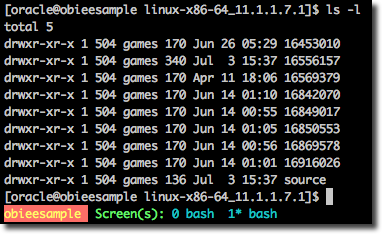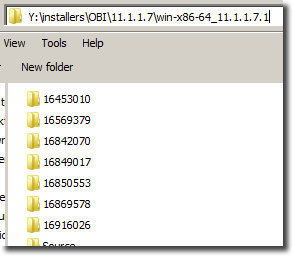Patch OBIEE the quicker way - with OPatch napply
Since 2012, Oracle's patching strategy for OBIEE has been Bundle Patches released approximately once a month. These bundle patches are usually cumulative ones, applied on top of the .0 version of the product. Patching is done through Oracle’s standard OPatch tool, which manages the application of patches along with an inventory of them and rollback if necessary.
I've previously written about the overall patching process here. OPatch is part and parcel of an OBIEE sysadmin's life, so I wanted to share this short article to show the quicker way to apply the PSUs. It uses a more direct way than the patch documentation describes, taking advantage of the napply option of OPatch (documented here). By using this option OPatch will apply all listed patches in one go, rather than one at a time. As well as this, we can use the silent flag to stop OPatch from prompting to apply each patch in turn.
- Download the necessary patches - for 11.1.1.7.1 this is 16569379 and 16556157. In a server environment you can use wget to download the patches as detailed here.
- Validate the checksums for the downloaded files, to make sure they didn’t get corrupted during download. Use the Digest link when downloading to view the checksums. For example, the Linux x86-64 checksums are :
p16556157_111170_Linux-x86-64.zip 2673750617 bytes MD5 D3DDDEC4CB189A53B2681BA6522A0035p16569379_111170_Linux-x86-64.zip 93617 bytes
MD5 2BC0E8B903A10311C5CBE6F0D4871E31
- Unzip the patches. Within the main patch (16556157) there are a series of further zip archives - unzip these too
- Put all the patch folders in a single folder, so it looks something like this:
[caption id="" align="alignnone" width="250"]
 Patches on Linux[/caption]
Patches on Linux[/caption][caption id="" align="alignnone" width="250"]
 Patches on Windows[/caption]
Patches on Windows[/caption] - Take backups, as described in the patch documentation.
- Set your environment variables, setting
PATCH_FOLDERto the folder you unzipped the patches to in step 4 above, andORACLE_HOMEto yourFMW_HOME/Oracle_BI1folder- Windows:
set PATCH_FOLDER=Y:\installers\OBI\11.1.1.7\win-x86-64_11.1.1.7.1 set ORACLE_HOME=c:\oracle\middleware\Oracle_BI1set JAVA_HOME=%ORACLE_HOME%\jdk
set PATH=%ORACLE_HOME%\OPatch;%JAVA_HOME%\bin;%ORACLE_HOME\bin%;%PATH%
- Linux:
export PATCH_FOLDER=/mnt/hgfs/installers/OBI/11.1.1.7/linux-x86-64_11.1.1.7.1 export ORACLE_HOME=/home/oracle/obiee/Oracle_BI1export JAVA_HOME=$ORACLE_HOME/jdk
export PATH=$ORACLE_HOME/OPatch:$JAVA_HOME/bin:$ORACLE_HOME/bin:$PATH
- Windows:
- Shut down OPMN, the Managed Server and the Admin Server
- Apply all the patches in one go, with no prompting:
- Windows:
opatch napply -silent %PATCH_FOLDER% -id 16453010,16842070,16849017,16850553,16869578,16916026,16569379 - Linux:
opatch napply -silent $PATCH_FOLDER -id 16453010,16842070,16849017,16850553,16869578,16916026,16569379
- Windows:
- Validate that they’ve been applied - the following should list all seven patches plus the bugs they fix:
opatch lsinventory - Per the instructions in the README.html for patch
16453010for post-patch actions:- Windows:
del%ORACLE_HOME%\bifoundation\web\catalogmanager\configuration\org.eclipse.osgicopy %ORACLE_HOME%\clients\bipublisher\repository\Tools\BIPublisherDesktop*.exe %ORACLE_HOME%\..\user_projects\domains\bifoundation_domain\config\bipublisher\repository\Toolsdel%ORACLE_HOME%\bifoundation\web\catalogmanager\configuration\org.eclipse.equinox.appcopy %ORACLE_HOME%\clients\bipublisher\repository\Admin\DataSource\msmdacc64.dll %ORACLE_HOME%..\user_projects\domains\bifoundation_domain\config\bipublisher\repository\Admin\DataSource
for /d /r %ORACLE_HOME%..\user_projects\domains\bifoundation_domain\servers\bi_server1\tmp_WL_user\bipublisher_11.1.1 %d in (jsp_servlet) do @if exist "%d" rd /s/q "%d"
- Linux:
rm -rv $ORACLE_HOME/bifoundation/web/catalogmanager/configuration/org.eclipse.osgi rm -rv$ORACLE_HOME/bifoundation/web/catalogmanager/configuration/org.eclipse.equinox.appcp $ORACLE_HOME/clients/bipublisher/repository/Tools/BIPublisherDesktop*.exe $ORACLE_HOME/../user_projects/domains/bifoundation_domain/config/bipublisher/repository/Tools/
cp $ORACLE_HOME/clients/bipublisher/repository/Admin/DataSource/msmdacc64.dll $ORACLE_HOME/../user_projects/domains/bifoundation_domain/config/bipublisher/repository/Admin/DataSource
rm -rfv $ORACLE_HOME/../user_projects/domains/bifoundation_domain/servers/bi_server1/tmp/_WL_user/bipublisher_11.1.1/*/jsp_servlet
msmdacc64.dlldidn’t exist on either of my installations that I’ve tried this on) - Windows:
- Start up Admin Server, Managed Server, and OPMN. Login to OBIEE and check the new version:

- Don't forget to check the README.html for patch 16453010 for full instructions on updating the client, customised skins, mapviewer config, etc.
